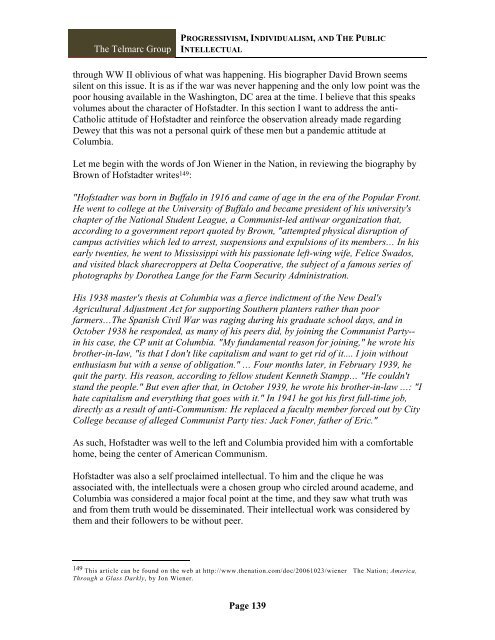progressivism, individualism, and the public ... - Telmarc Group
progressivism, individualism, and the public ... - Telmarc Group
progressivism, individualism, and the public ... - Telmarc Group
You also want an ePaper? Increase the reach of your titles
YUMPU automatically turns print PDFs into web optimized ePapers that Google loves.
The <strong>Telmarc</strong> <strong>Group</strong><br />
PROGRESSIVISM, INDIVIDUALISM, AND THE PUBLIC<br />
INTELLECTUAL<br />
through WW II oblivious of what was happening. His biographer David Brown seems<br />
silent on this issue. It is as if <strong>the</strong> war was never happening <strong>and</strong> <strong>the</strong> only low point was <strong>the</strong><br />
poor housing available in <strong>the</strong> Washington, DC area at <strong>the</strong> time. I believe that this speaks<br />
volumes about <strong>the</strong> character of Hofstadter. In this section I want to address <strong>the</strong> anti-<br />
Catholic attitude of Hofstadter <strong>and</strong> reinforce <strong>the</strong> observation already made regarding<br />
Dewey that this was not a personal quirk of <strong>the</strong>se men but a p<strong>and</strong>emic attitude at<br />
Columbia.<br />
Let me begin with <strong>the</strong> words of Jon Wiener in <strong>the</strong> Nation, in reviewing <strong>the</strong> biography by<br />
Brown of Hofstadter writes 149 :<br />
"Hofstadter was born in Buffalo in 1916 <strong>and</strong> came of age in <strong>the</strong> era of <strong>the</strong> Popular Front.<br />
He went to college at <strong>the</strong> University of Buffalo <strong>and</strong> became president of his university's<br />
chapter of <strong>the</strong> National Student League, a Communist-led antiwar organization that,<br />
according to a government report quoted by Brown, "attempted physical disruption of<br />
campus activities which led to arrest, suspensions <strong>and</strong> expulsions of its members… In his<br />
early twenties, he went to Mississippi with his passionate left-wing wife, Felice Swados,<br />
<strong>and</strong> visited black sharecroppers at Delta Cooperative, <strong>the</strong> subject of a famous series of<br />
photographs by Doro<strong>the</strong>a Lange for <strong>the</strong> Farm Security Administration.<br />
His 1938 master's <strong>the</strong>sis at Columbia was a fierce indictment of <strong>the</strong> New Deal's<br />
Agricultural Adjustment Act for supporting Sou<strong>the</strong>rn planters ra<strong>the</strong>r than poor<br />
farmers…The Spanish Civil War was raging during his graduate school days, <strong>and</strong> in<br />
October 1938 he responded, as many of his peers did, by joining <strong>the</strong> Communist Party-in<br />
his case, <strong>the</strong> CP unit at Columbia. "My fundamental reason for joining," he wrote his<br />
bro<strong>the</strong>r-in-law, "is that I don't like capitalism <strong>and</strong> want to get rid of it.... I join without<br />
enthusiasm but with a sense of obligation." … Four months later, in February 1939, he<br />
quit <strong>the</strong> party. His reason, according to fellow student Kenneth Stampp… "He couldn't<br />
st<strong>and</strong> <strong>the</strong> people." But even after that, in October 1939, he wrote his bro<strong>the</strong>r-in-law …: "I<br />
hate capitalism <strong>and</strong> everything that goes with it." In 1941 he got his first full-time job,<br />
directly as a result of anti-Communism: He replaced a faculty member forced out by City<br />
College because of alleged Communist Party ties: Jack Foner, fa<strong>the</strong>r of Eric."<br />
As such, Hofstadter was well to <strong>the</strong> left <strong>and</strong> Columbia provided him with a comfortable<br />
home, being <strong>the</strong> center of American Communism.<br />
Hofstadter was also a self proclaimed intellectual. To him <strong>and</strong> <strong>the</strong> clique he was<br />
associated with, <strong>the</strong> intellectuals were a chosen group who circled around academe, <strong>and</strong><br />
Columbia was considered a major focal point at <strong>the</strong> time, <strong>and</strong> <strong>the</strong>y saw what truth was<br />
<strong>and</strong> from <strong>the</strong>m truth would be disseminated. Their intellectual work was considered by<br />
<strong>the</strong>m <strong>and</strong> <strong>the</strong>ir followers to be without peer.<br />
149 This article can be found on <strong>the</strong> web at http://www.<strong>the</strong>nation.com/doc/20061023/wiener The Nation; America,<br />
Through a Glass Darkly, by Jon Wiener.<br />
Page 139












